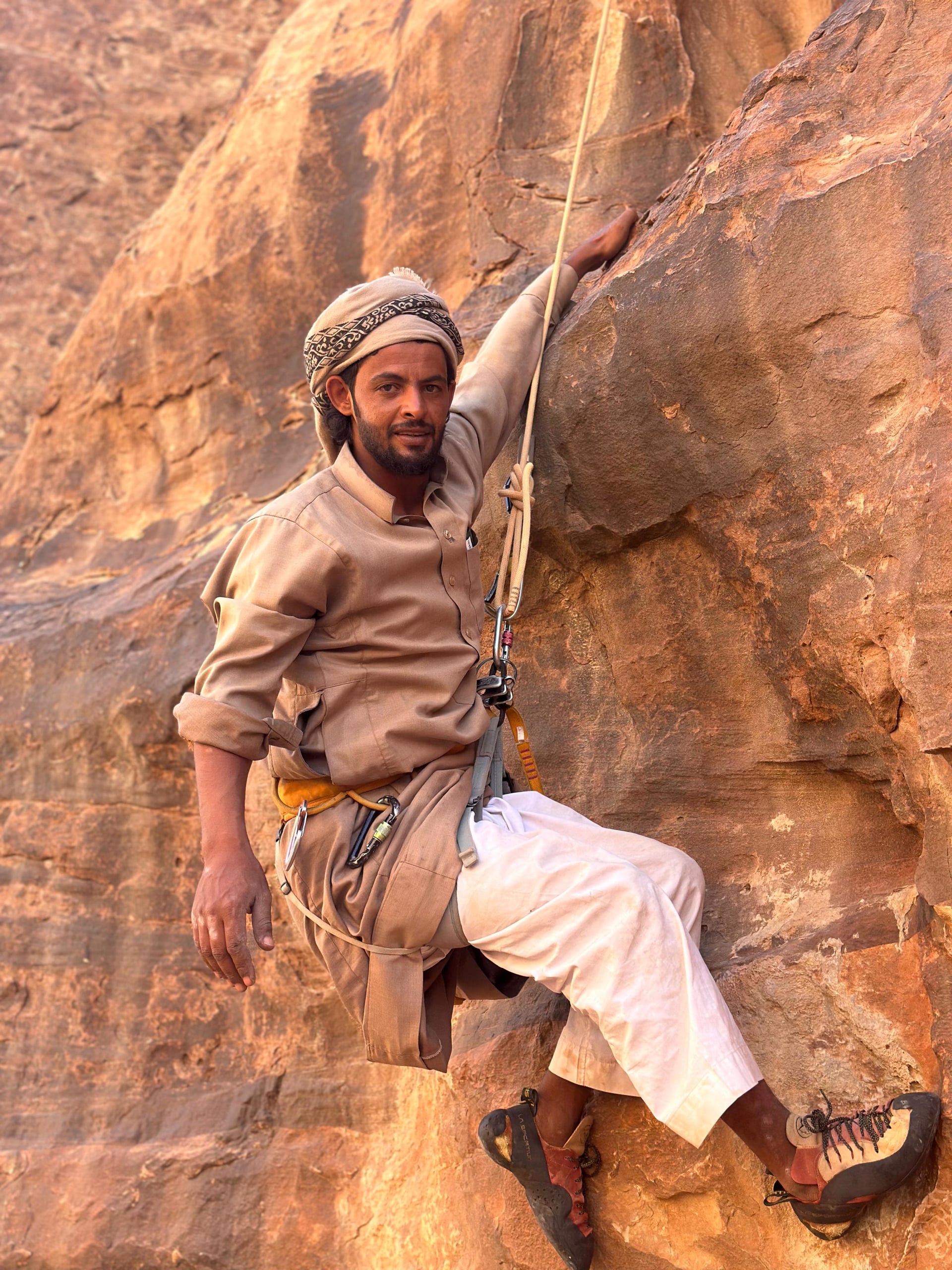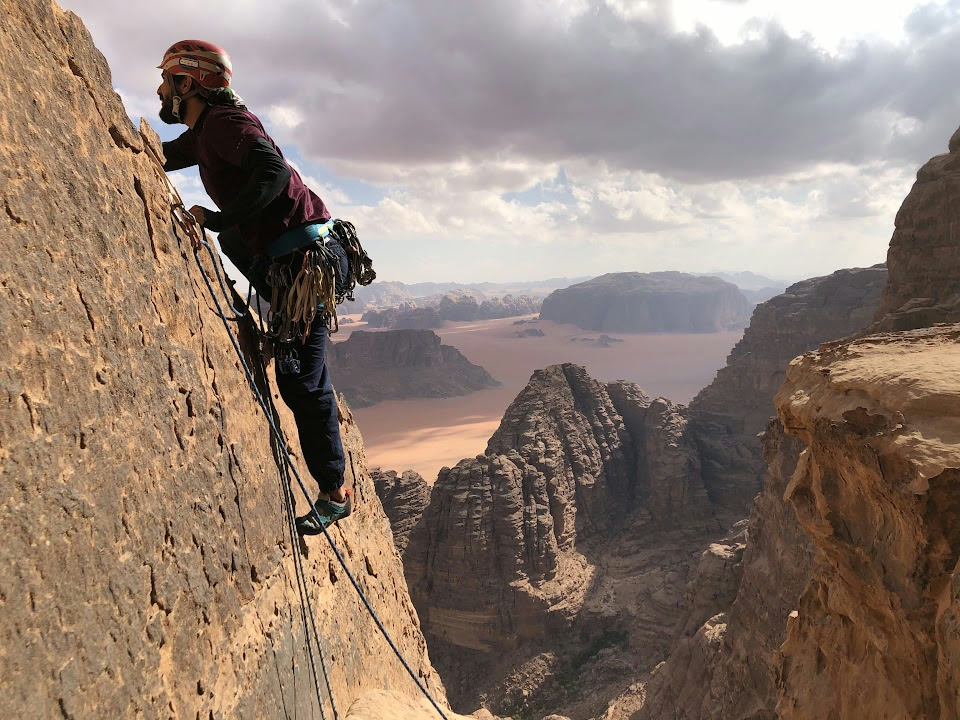In September 1984, when Tony Howard and his team arrived in Wadi Rum, they had no idea they were about to begin a partnership that would last decades and transform climbing in Jordan. This is the story of that first meeting-told from both perspectives.
The Arrival
When Tony Howard's team arrived at the disused government rest house and began setting up their tents, a young man walked across to them. That young man was Defallah Atieq-my uncle. He had classical Bedouin features: long wild black hair, equally wild dark eyes, and a flashing smile.
Defallah asked why they were in Wadi Rum and what they planned to do. When they showed him their ropes and climbing gear, his response captured the essence of Bedouin climbing tradition:
"Why do you need all that? We climb everywhere and need nothing, just a gun to shoot the ibex."
- Defallah Atieq, 1984
An Arabic Saying
Then Defallah added something that would set the tone for everything that followed. He said he would take them to meet his father, Sheikh Atieq, but first he shared an Arabic saying:
"Remember that if you are hard with us we will break you, if you are soft with us we will squeeze you, but if you respect us we will be your friends."
This wasn't a threat-it was an invitation to mutual respect. The Bedouin were testing these foreigners to see what kind of people they were. Would they be like the tourists who walked into tents uninvited with cameras? Or would they show proper respect?
The Hidden Camp
Defallah drove them into the desert, out across the orange sands and around the end of Jebel Um Ishrin. They were surprised to see yet more mountains that had been hidden from view, their domes of white sandstone rising like petrified cumulus clouds.
After topping a dune, they descended into a concealed sandy hollow ringed by cliffs, then over another dune to arrive abruptly at the hidden camp. Two of Defallah's brothers were there-Mazied, on leave from the army, and Eid, the youngest, still asleep in the tent.
Sheikh Atieq, then in his eighties but still strong and agile, was wrestling a camel to the ground to treat a wound. This was the man who, thirty-two years earlier, had hunted ibex with Tom Longstaff's family on Jebel Rum.
The Coffee Ceremony
Defallah welcomed them to his tent, where his sword hung from a pole, and invited them to sit while he prepared coffee. This wasn't just making a drink-it was a time-honored ritual, a show of hospitality that is very much a part of Bedouin life.
The ceremony unfolded with precision:
- 1. He slowly heated the beans in a special skillet over the fire
- 2. He ground them with cardamom pods in a large brass pestle and mortar, chiming it like a bell to welcome guests
- 3. The coffee was put into a brass beak-mouthed pot with hot water added
- 4. He tasted and approved it before offering it to the guests
The Three Cups
Defallah offered three symbolic cups to each guest in turn:
- • The Guest Cup: The welcoming cup
- • The Sword Cup: Served to honor the guest and show there are no disputes
- • The Pleasure Cup: For shared enjoyment
This ceremony still continues today. When you climb with me, you'll experience the same hospitality that Tony Howard received forty years ago.
The Proposal
Ceremony over, they were offered tea. Over the tea, they explained why they were there:
"We hope to climb your mountains, and if the climbing is good, as Defallah says it is, we can write about them and maybe more climbers will come. If you are not happy with that then we can leave, but we hope it might be beneficial for you."
After talking with his father, Defallah replied with words that would begin a new era for Wadi Rum:
"My father thinks it is a good idea. We know many climbs, so we will be happy to help you. We are making dinner for you. You are welcome to stay tonight."
The Beginning of a Partnership
Tony Howard later wrote: "It was the first of many wonderful days with people who were to become the closest of friends."
As luck would have it, the dira (traditional tribal area) of Sheikh Atieq's family included all the best mountains and trekking areas. The Bedouin made them welcome in their camps, driving them around the mountains and pointing out hidden water sources and ancient hunting routes.
They spent numerous nights in Bedouin tents and were invited as guests to wedding feasts. Tony's team learned to think like Bedouin hunters, who have learned to think like ibex. Without this freely shared knowledge, they would never have achieved so much.
The Bedouin Sense of Humor
The Bedouin had a climber's sense of humor. They pointed Tony's team toward routes, giving just enough information to get started, then were there to meet them on their return, "grinning mischievously if we had been lost in the bizarre maze of these sandstone mountains."
Tony wrote: "We liked their climber's sense of humour and thanks to them we learned to think like Bedouin hunters, who have learned to think like ibex."
Mutual Respect
What made this partnership work was mutual respect. Tony and his team didn't come as conquering heroes or exotic tourists. They came with genuine interest in the mountains and respect for the people who knew them best.
The Bedouin, initially suspicious of their reasons for wanting to climb, recognized this respect. They had "a climber's pride in their routes" and were happy to share them with people who understood their value.
The Legacy Continues
Forty years later, this partnership continues. I am the grandson of Sheikh Atieq, and I carry on the tradition of sharing our mountains with respectful climbers from around the world. When you climb with me, you're not just hiring a guide-you're becoming part of a story that began with that first meeting in 1984.
Join This TraditionWhat This Means Today
The relationship that began with that coffee ceremony in 1984 established a model for how climbing tourism could work in Wadi Rum:
- • Mutual Benefit: Climbers get access to incredible routes and local knowledge; Bedouin get economic opportunity and recognition of their mountain heritage
- • Cultural Exchange: Not just a service transaction, but genuine friendship and learning
- • Preservation: Economic incentive to maintain traditional skills and knowledge
- • Respect: Recognition that Bedouin are not exotic curiosities but expert mountaineers with unparalleled knowledge
When you come to Wadi Rum, remember Defallah's words: "If you respect us we will be your friends." This is still true today. Come with respect, and you'll find not just great climbing, but genuine hospitality and friendship that can last a lifetime.
Source: This article is based on Tony Howard's first-hand account in his book "Quest into the Unknown: My Life as a Climbing Nomad" (Chapters 37-38), combined with oral histories passed down through my family. All quotes are from Tony Howard's book, used with respect and attribution.


💬 Join the Discussion
Share your thoughts, experiences, or questions about this article